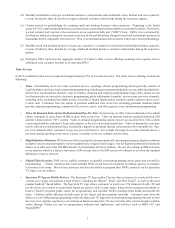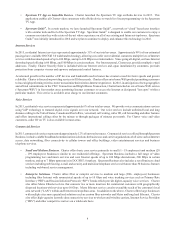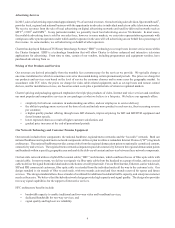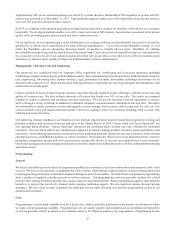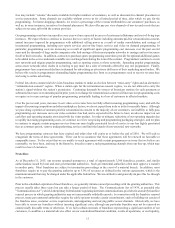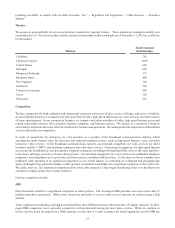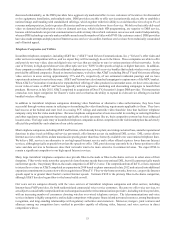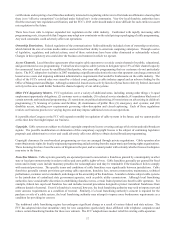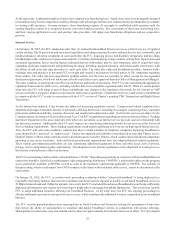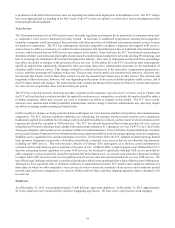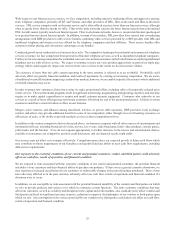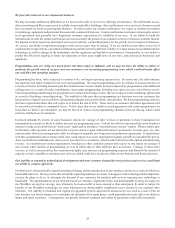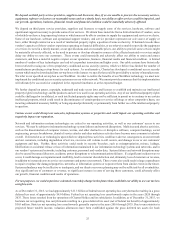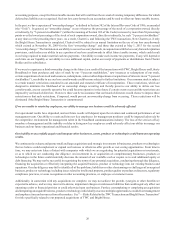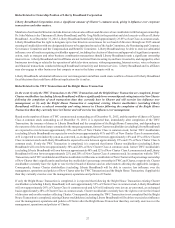Charter 2015 Annual Report Download - page 32
Download and view the complete annual report
Please find page 32 of the 2015 Charter annual report below. You can navigate through the pages in the report by either clicking on the pages listed below, or by using the keyword search tool below to find specific information within the annual report.17
certifications and requiring a local franchise authority interested in regulating cable rates to first make an affirmative showing that
there is no “effective competition” (as defined under federal law) in the community. Very few local franchise authorities have
filed the necessary rate regulation certification, and the FCC’s 2015 order should make it more difficult for such entities to assert
rate regulation in the future.
There have been calls to impose expanded rate regulation on the cable industry. Confronted with rapidly increasing cable
programming costs, it is possible that Congress may adopt new constraints on the retail pricing or packaging of cable programming.
Any such constraints could adversely affect our operations.
Ownership Restrictions. Federal regulation of the communications field traditionally included a host of ownership restrictions,
which limited the size of certain media entities and restricted their ability to enter into competing enterprises. Through a series
of legislative, regulatory, and judicial actions, most of these restrictions have been either eliminated or substantially relaxed.
Changes in this regulatory area could alter the business environment in which we operate.
Access Channels. Local franchise agreements often require cable operators to set aside certain channels for public, educational,
and governmental access programming. Federal law also requires cable systems to designate up to 15% of their channel capacity
for commercial leased access by unaffiliated third parties, who may offer programming that our customers do not particularly
desire. The FCC adopted revised rules in 2007 mandating a significant reduction in the rates that operators can charge commercial
leased access users and imposing additional administrative requirements that would be burdensome on the cable industry. The
effect of the FCC's revised rules was stayed by a federal court, pending a cable industry appeal and an adverse finding by the
Office of Management and Budget. Although commercial leased access activity historically has been relatively limited, increased
activity in this area could further burden the channel capacity of our cable systems.
Other FCC Regulatory Matters. FCC regulations cover a variety of additional areas, including, among other things: (1) equal
employment opportunity obligations; (2) customer service standards; (3) technical service standards; (4) mandatory blackouts of
certain network and syndicated programming; (5) restrictions on political advertising; (6) restrictions on advertising in children's
programming; (7) licensing of systems and facilities; (8) maintenance of public files; (9) emergency alert systems; and (10)
disability access, including new requirements governing video-description and closed-captioning. Each of these regulations
restricts our business practices to varying degrees and may impose additional costs on our operations.
It is possible that Congress or the FCC will expand or modify its regulation of cable systems in the future, and we cannot predict
at this time how that might impact our business.
Copyright. Cable systems are subject to a federal copyright compulsory license covering carriage of television and radio broadcast
signals. The possible modification or elimination of this compulsory copyright license is the subject of continuing legislative
proposals and administrative review and could adversely affect our ability to obtain desired broadcast programming.
Copyright clearances for non-broadcast programming services are arranged through private negotiations. Cable operators also
must obtain music rights for locally originated programming and advertising from the major music performing rights organizations.
These licensing fees have been the source of litigation in the past, and we cannot predict with certainty whether license fee disputes
may arise in the future.
Franchise Matters. Cable systems generally are operated pursuant to nonexclusive franchises granted by a municipality or other
state or local government entity in order to utilize and cross public rights-of-way. Cable franchises generally are granted for fixed
terms and in many cases include monetary penalties for noncompliance and may be terminable if the franchisee fails to comply
with material provisions. The specific terms and conditions of cable franchises vary significantly between jurisdictions. Cable
franchises generally contain provisions governing cable operations, franchise fees, system construction, maintenance, technical
performance, customer service standards, and changes in the ownership of the franchisee. A number of states subject cable systems
to the jurisdiction of centralized state government agencies, such as public utility commissions. Although local franchising
authorities have considerable discretion in establishing franchise terms, certain federal protections benefit cable operators. For
example, federal law caps local franchise fees and includes renewal procedures designed to protect incumbent franchisees from
arbitrary denials of renewal. Even if a franchise is renewed, however, the local franchising authority may seek to impose new and
more onerous requirements as a condition of renewal. Similarly, if a local franchising authority's consent is required for the
purchase or sale of a cable system, the local franchising authority may attempt to impose more burdensome requirements as a
condition for providing its consent.
The traditional cable franchising regime has undergone significant change as a result of various federal and state actions. The
FCC has adopted rules that streamline entry for new competitors (particularly those affiliated with telephone companies) and
reduce certain franchising burdens for these new entrants. The FCC adopted more modest relief for existing cable operators.


